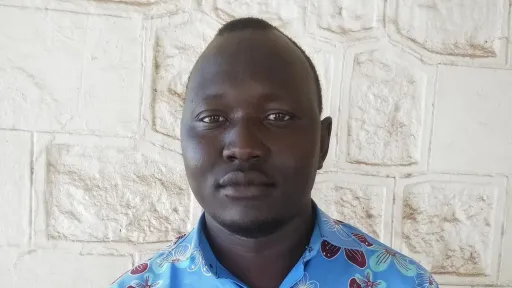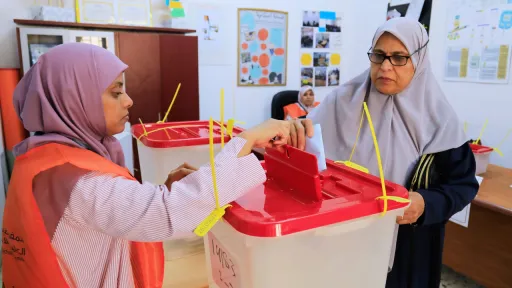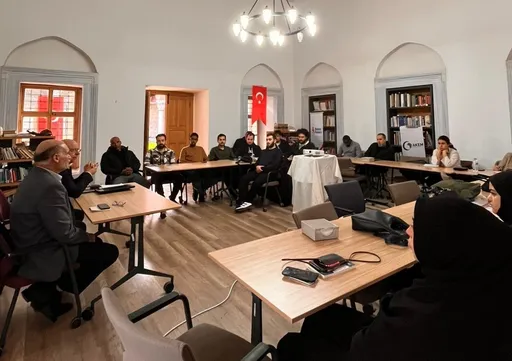By Abdulwasiu Hassan
Taham Adamu Abubakar, a father of four, recounts in graphic detail what it feels like to be a parent watching his child squirm and scream while a traditional healer prepares to excise the small, soft piece of flesh called uvula that hangs from the top of the inside of the mouth, just above the throat.
"When they hold the child, they appear to treat him as though they don't like him. The child will start crying, and you will be apprehensive thinking they are going to hurt him," Taham, a native of Giade in northern Nigeria, tells TRT Afrika.
"They are about to cut your child's uvula. You know it's necessary but it isn't easy sitting through that and not worrying," he says with all the experience of a father whose four kids underwent traditional uvulectomy early.
In northern Nigeria, uvulectomy on newborn babies is a common practice. The procedure is usually done by a traditional surgeon, referred to as wanzami or wanzam in the local Hausa language.
In traditional Hausa society, a wanzami performs operations including circumcision, cupping and the removal of uvula.
"Of all the things our profession requires us to do, removal of the uvula is the most difficult," Baffa Aliyu Zindiri, aka Baffa Wanzam, tells TRT Afrika. "That's because the part that has to be removed is very close to the oesophagus," he adds.
Baffa Wanzam believes precision and focus are crucial to the intricate process of uvulectomy.
Holding breath
The traditional surgeon uses a stick called mataki to press the tongue of the child and an iron with a curved end to remove the uvula. Care must be taken not to shake either tool lest any erratic movement damage the organs near the throat.
"When the child opens his mouth to cry, you will use the mataki to press the tongue before he can close it," Baffa Wanzam explains. "If you press the mouth before it closes), you will see the uvula on top of the stick."
Once the uvula settles on the stick, the surgeon needs to hold his breath before putting the curved iron to work.
"If you breathe, your hand will move. Once your hand shakes, the iron can turn and touch the throat or the base of the tongue," warns Baffa Wanzam. "Also, if the uvula is not completely removed, it can grow back."
According to him, mastering uvulectomy is the pinnacle of a traditional wanzami's profession. Once an apprentice learns how to carry out the surgery, he qualifies to be called a wanzami.
Fraught with risk
The practice of removing the uvula stems from the belief that if it is allowed to keep growing, even a baby being breastfed would be prone to throw up.
Taham, who went through the procedure as a child just as his own kids, is convinced that uvulectomy helps children avoid the problems associated with the growth of the uvula till maturity.
But practitioners of modern medicine say uvulectomy shouldn't be done for any reason other than a rare medical problem that requires such intervention.
"Uvulectomy as a traditional practice is generally considered unnecessary and potentially harmful by medical professionals," says Dr Fatima Damagum, a family physician at Aminu Kano University Teaching Hospital in Nigeria's northern city of Kano.
“In some villages in Kano state of northern Nigeria, some people believe that uvulectomy can cure or prevent various ailments such as excessive salivation, speech disorders, sore throat, tonsillitis, and certain respiratory conditions," she says.
In reality, the major function of the uvula is to prevent water and food from going up the nose when one swallows.
Medical experts say uvulectomy through traditional means is fraught with risk.
“The risks associated with uvulectomy include bleeding, infection, damage to surrounding structures, and disruptions in speech, swallowing, breathing. In more serious cases, it could lead to death," says Dr Damagum.
“One of the commonest complications of this practice is bleeding. Sometimes, the bleeding occurs internally, and the child continues to swallow the blood as it occurs without the parent noticing until the bleeding is significant enough to cause anaemia and, subsequently, death."
It still flourishes
Another common complication is infection introduced into the body from the blades used to cut the uvula. Infections such as HIV, hepatitis B and C, as well as other bacterial infections are something to watch out for, says Dr Damagum.
Those who carry out traditional uvulectomy dispute the medical warnings. To them, the procedure is safe when done properly.
"This year marks the 35th since I started performing uvulectomy. Nobody whose uvula I have removed has ever faced any complication," says Baffa Wanzam.
Taham endorses the traditional surgeon's claim. "Neither I nor my children faced any complication after the surgery," he says.
Baffa Wanzam has lost count of the number of people he has operated on since he started out. “I have performed uvulectomy on a father and, decades later, his son. I did it for a mother and then her daughter. On a given day, one can visit five to six houses and sometimes go three to four days without any surgery," he tells TRT Afrika.
Although he has started allowing his trainees to do uvulectomy, Baffa Wanzam says he has performed "50-60" such procedures himself this year alone.
Extra care needed
Medical experts recommend that people who have undergone the traditional procedure need to visit a hospital for an examination by a qualified professional.
"The aim is to determine what type of uvulectomy was done (total or partial), and the extent of the injury. Vital signs will be monitored, and blood samples will be taken for tests,” Dr Damagum says.
"An ultrasound scan may be done to confirm if there's internal bleeding. An empirical dose of broad-spectrum antibiotic should be administered to prevent infections."
If bleeding is suspected, the child may be transfused with blood or given volume expanders. "It is paramount to administer an anti-tetanus vaccine," Dr Damagum recommends.
The doctor also advises those that have undergone uvulectomy to keep one's mouth clean with brushing and mouthwash, drink plenty of fluids, suck on boiled sweets or chew gum, stay away from those with cough and cold, and eat soft food for as long as swallowing is difficult.
























